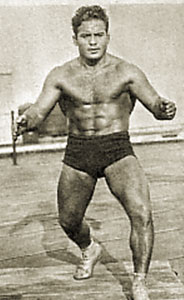 There were 100,000 people in the Athens Olympic Stadium
that night in 1934 when Jim Londos defended his world's heavyweight wrestling
title against the Russian champion, and another 30,000 were turned away. There were 100,000 people in the Athens Olympic Stadium
that night in 1934 when Jim Londos defended his world's heavyweight wrestling
title against the Russian champion, and another 30,000 were turned away.
One who got in was a Greek named Theophelos, a former amateur
wrestler himself. He was also Jim Londos' father.
"He never wanted me to become a professional," said Londos. "He
always thought it was wrong. But he agreed to come to this match. After I won, a
king's guard carried both of us out of the arena on their shoulders.
"Dad came up to me afterward, smiled, and said, 'Son, all is
forgiven.'"
The brightness in Jim Londos' eyes couldn't be hidden as he wat
there talking about it, 35 years later, in the room where the people had come to
honor him.
Londos is about 75 years old now, although the years guard
secrets well and this is one he prefers to keep hidden.
The body is not the superb thing it once was, the physique
something that appeared to have been carved out of marble, but neither is it the
body of a 75-year-old man.
"Condition," he says. "You must stay in condition. I learned
that lesson from my father, and I haven't forgotten it."
That was the thing that everyone remembers best about Jim
Londos.
"He worked harder at being an athlete," says George Parnassus, a
friend of decades, "than any man I have ever known."
Another longtime friend, Sid Marks, recalls that Londos once
invited him down to the beach for a morning workout.
"He walked two miles in the sand," said Marks. "Backwards! I
couldn't believe it. I've seen thousands of wrestlers and I never knew a man who
had more pride, or was a better-conditioned athlete."
It perhaps figures, then, that Londos should have been the
heavyweight wrestling champion of the world, almost uninterrupted from 1930
through 1946.
His career spanned two eras, the honest and the not-so-honest.
This appears to be one of the few blind spots the man has. He refuses to admit
that he ever went into a bout knowing who the winner was going to be.
But it is likely that could have beaten almost anyone, anyway.
He came to America from Greece at age 13, sometime in the early
years of the century and migrated quickly to San Francisco. The living came
hard. He worked as a water boy for a railroad gang, at 50 cents a day, and then
as a busboy. But within two years, he was wrestling as an amateur and, in 1920
(sic), he turned professional.
Through the tiny gyms, the sleazy promotions, he worked and
progressed and in 10 years he had been Dick Shikat for the championship.
"There were many good wrestlers around then," he says, "30 or 40
of almost equal ability. The difference was keeping yourself in better shape
than the other man. Condition, and the proper mental attitude, are always the
deciding factors."
Londos was never a big man, as wrestlers are measured. At the
start he weighed only 140 pounds and even as champion he never went over 204.
His weight today is 185.
Londos ignores the fact that he soon will become an octogenarian
by running 3-5 miles at least three times a week, walking long distances daily,
climbing and doing calisthenics on a 10-foot stepladder, doing 25-35 pushups
every other day and lying on his back and raising his legs in the air 150 times
every morning.
His life has been notable. He has a wife and three daughters,
and an avocado ranch in Escondido that is now being subdivided for homes and
apartments ("The avocados," he said, "got old --like me"). He received the Cross
of the Golden Phoenix, a rarely presented award, from King Paul of Greece, for
his philanthropic work with orphans on Cyprus. He is a member of the San Diego
Sports Hall of Fame.
"I have no complaints," Londos says. "I do well. My life is
comfortable." There are few things he would change if he could. He smiles
slightly and looks straight at you.
"One thing," he says. "When I was young, I never had much money.
Never enough so that I could go on to school, and I would do that if I could. I
like philosophy. I would study that. It is a wonderful thing to be able to
express yourself precisely and to the point.
"It was Cicero who said that the reason man excels the other
animals is that he can talk and think and express himself. I try to excel. You
excel everyone and you're doing pretty well, huh?"
Those who know him would not question that he has excelled most
of them. They came in large numbers to honor him here last week at the World
Explorers-Sportsmen's Club.
"I guess," said one of them, "that Jim Londos has more friends
than anybody I know."
Londos, meanwhile, sat there in the smoke-filled, booze-heavy
room and shunned the cigarets and the liquor, as he always has. He was even
oblivious to the hubbub around him as he spoke in a soft, almost inaudible
voice. He was talking about the profession that left him with a cauliflowered
left ear, five broken ribs, a torn ankle ligament and a separated shoulder or
two -- but also with a healthy outlook on this life.
This time he quoted one of his own people, a Greek, a man named
Socrates.
"Socrates said, 'Be right, and fear no man, alive or
dead.'" |
No comments:
Post a Comment